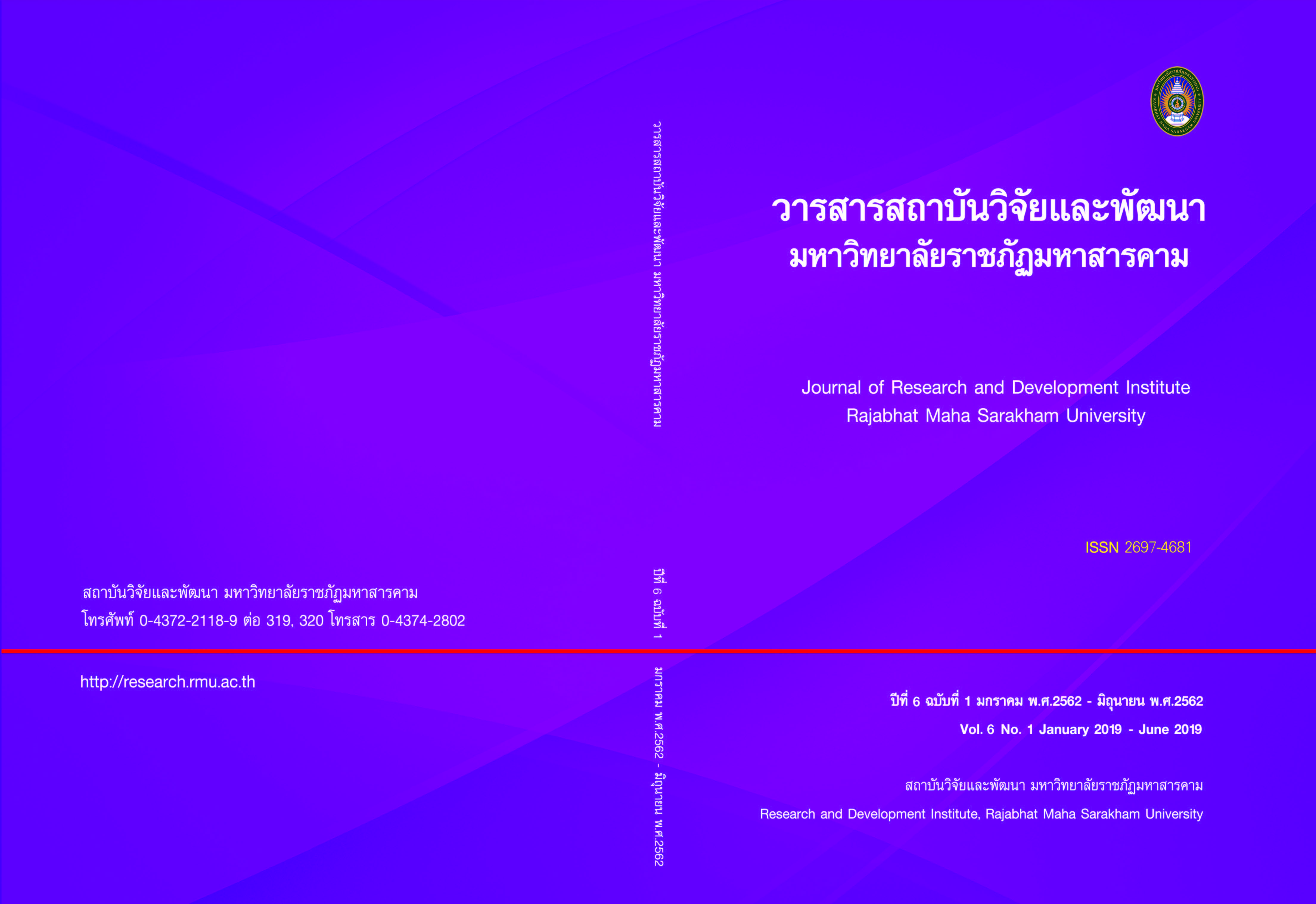Early Childhood Education Management for Thailand 4.0, Private Schools in Maha Sara kham Province
Keywords:
Model, Early Childhood Education Management, Thailand 4.0Abstract
The purposes of this study were to create early childhood education management for Thailand 4.0 of private Schools in Maha Sara kham. The study was conducted along the processes of research and development approach consisting 3 phases of study. Phase 1 focused on investigate the current situation early childhood education management for Thailand 4.0 of private Schools in Maha Sara kham. Phase 2 create early childhood education management for Thailand 4.0 of private Schools in Maha Sara kham. Phase 3 the model was implemented and evaluation early childhood education management for Thailand 4.0 of private Schools in Maha Sara kham. The instruments used in the data collection were a set of questionnaire, evaluation form, and rubric scoring tool designed in 5 Likert-scales. Both qualitative and quantitative data were analyzed in the study. The statistics used in the data analysis were Mean Score and Standard Deviation. The result showed that the current situation early childhood education management for Thailand 4.0 of private Schools in Maha Sara kham. There are average values on all sides 4.43 stay on good level. There is average of low 3 levels as the following. There are average values the Curriculum sides 4.19 stay on good level. There are average values the measurement and evaluation sides 4.18 stay on good level. There are average values the Relationship between teacher and parent sides 4.20 stay on good level.
References
Bredekamp, S. and C. Copple. (1997). Developmentally Appropriate Practice in Early Childhood Programs. Washington,DC : NAEYC.
Chuankid Masena. (2011). Form of early childhood education management that is consistent with brain development. Doctor of Philosophy Thesis, Ubon Ratchathani Rajabhat University. [in Thai].
Constitution of the Kingdom of Thailand. (2007). Government Gazette. Volume 124, Episode 47 Kor, Page 23. 24 August 2007. [in Thai].
Khanueng Saikeaw. (2009). Proposed policy for administration of early childhood education in Surin province. Doctor of Philosophy Thesis : Khonkaen University. [in Thai].
Kullaya Tuntiphalachiwa. (2008). Early Childhood Education Model. Bangkok : BrenBassbook,. [in Thai].
Ministry of Education (2003). Early Childhood Education Program 2003. Bangkok: Teachers Council of Ladprao. [in Thai].
Ministry of Education. (2013). 120 Years, the Ministry of Education and Thai Education. Bangkok : Ministry of Education. [in Thai].
Narisanan Dedchasura. (2009). The administrative model for early Childhood Laboratory School of Rajabhat Universities. Graduate School Thesis, Silpakorn University. [in Thai].
Office of the Education Council. (2007). Policies and strategies for early childhood development (0-5 Years). Bangkok : VTC Communication. [in Thai].
Office of the Education Council. (2010). Revised National Education Plan (2009-2016). Bangkok : Graphic Sweet Pepper. [in Thai].
Office of the National Economic and Social Development Board. (2016). The 11th National Economic and Social Development Plan (2012-2016). Bangkok : Office of the National Economic and Social Development Board. [in Thai].
Office of the National Economic and Social Development Board. (2015). “The 12th National Economic and Social Development Plan (2016-2021) (Draft),” Bangkok : Office of the National Economic and Social Development Board. [in Thai].
Office of the National Education Commission. (1999). National Education Act 1999. Bangkok: Graphic sweet pepper. [in Thai].
Office of the National Education Commission. (2009). Early Childhood Learning Management Progress Report 2008-2009. Bangkok : Ploen Studio. [in Thai].
Office of the Private Education Commission. (2011). Educational Quality Assessment Guide. Bangkok : Educational Testing Bureau. [in Thai].
Phaithoon Sinlarat and Others. (2016A). Education 4.0 is more than Education. 2nd edition. Bangkok : Chulalongkorn University. [in Thai].
Phinsuda Sirittharungsree. (2010). Research report Future education in Thailand 10-20 Years. 2nd edition. Bangkok : Good Printing, [in Thai].
Rekha Sriwichai. (2011). AN ADMINISTRATIVE MODEL FOR AN EFFECTIVE EARLY CHILDHOOD PRIVATE SCHOOL IN NONTHABURI PROVINCE. Ph.D. Thesis (Public Administration). Bangkok : Sriprathum University. [in Thai].
Secretariat of the House of Representatives. (2015). Thailand Model 4.0: TDRI, the economic base newspaper. [Online] http://www.thansettakij.com/ [16 November 2016]. [in Thai].
Step into the Industrial Age 4.0. (2016). How will the Thai industry Adapt and Cope?. [Online] http:mmThailand.com/mmnew/industry-4-0.html. [22 November 2016]. [in Thai].
Tisana Khammani. (2011). Teaching styles: Various Choices. 7th edition. Bangkok : Chulalongkorn University. [in Thai].
Yaowapha Dechakhup. (1999). Administration and supervision in early childhood education. Bangkok : Mac. Printing. [in Thai].
Downloads
Published
How to Cite
Issue
Section
License
Articles that are published are copyrighted by the authors of the articles







